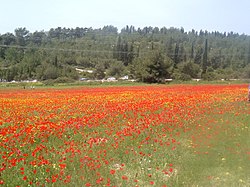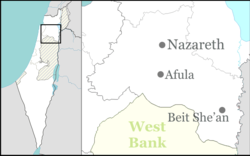Ein Hashofet
|
Ein HaShofet עֵין הַשּׁוֹפֵט |
|
|---|---|
 |
|
| Coordinates: 32°35′45.24″N 35°6′3.96″E / 32.5959000°N 35.1011000°ECoordinates: 32°35′45.24″N 35°6′3.96″E / 32.5959000°N 35.1011000°E | |
| Grid position | 160/222 PAL |
| District | Northern |
| Council | Megiddo |
| Affiliation | Kibbutz Movement |
| Founded | 5 July 1937 |
| Founded by | Hashomer Hatzair |
| Population (2015) | 821 |
| Name meaning | Spring of the Judge |
| Website | www.keh.co.il |
Ein HaShofet (Hebrew: עֵין הַשּׁוֹפֵט, lit. Spring of the Judge) is a kibbutz in northern Israel in the Hills of Ephraim. Located in the Menashe Heights region around 30 km from the city of Haifa, close to Yokneam, it falls under the jurisdiction of Megiddo Regional Council. In 2015 it had a population of 821.
"Ein HaShofet," literally, Judge's Spring, was named in honor of United States Supreme Court Justice Louis D. Brandeis (1856-1941), who played a leading role in the American Zionist movement. There is a flowing spring nearby the kibbutz.
A grave has been excavated here, yielding coins from Arcadius (395–408) and Theodosius II (408–450).
During the Ottoman era a Muslim village called Jarah existed in the area. In 1596 the village appeared under the name of Ja'ara in tax registers, being part of the nahiya (subdistrict) of Sahil Atlit in the Sanjak (district) of Lajjun. It had a population of 4 households, all Muslim. They paid a fixed tax-rate of 25% on agricultural products, including wheat, barley, summer crops, goats and beehives, in addition to occasional revenues; the taxes totalled 2,000 akçe.
In 1882, the Palestine Exploration Fund's Survey of Western Palestine described Jarah as "a small village on the east side of the watershed, with four springs below it. There are rock-cut tombs, so that the place seems to be an ancient site." They further noted that the tombs were blocked up.
...
Wikipedia

